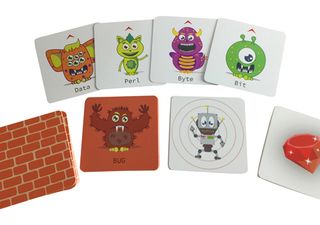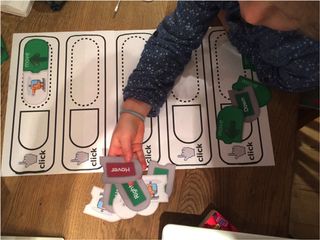These tips will keep kids interested in coding
The idea of cold, hard coding can be a real turn off. Here are our tips for inspiring the next generation of makers.

Getting kids interested in coding seemed somehow easier back in the days of the ZX Spectrum and Commodore 64. If you're having trouble, don't worry.
Whether it's inside the classroom or at home, there are a variety of fun and exciting ways to encourage children to learn to code.
We spoke to education professionals exhibiting at Bett 2015, the leading show for learning technology and asked for their advice on how to get to grips with it. Here are their top tips!
Adam Martin, founder of Everyone Can Program kicks off by telling us why programming is such an important skill to learn: "Programming helps you make sense of chaotic, uncontrolled situations. It teaches you ways of thinking that marshal the chaos and enable you to think calmly and effectively."
01. Build and Play Your Own Games
Microsoft's Education team believes in adding an element of fun and gaming to programming. "There are products available, such as Kodu that lets kids create games on the PC and Xbox via a simple visual programming language.
There is also the 'Kodu Kup', which is a competition that challenges school children aged between six and sixteen to develop their own computer games, using Kodu.
02. It's code and it's real
Jon Silvera, founder and managing director, FUZE Technologies explains the importance of linking the teaching practices to the real world "Schools should seek out resources and activities that will enable students to create something real".
Get the Creative Bloq Newsletter
Daily design news, reviews, how-tos and more, as picked by the editors.
Silvera continues: "For example, one school I work with has set its Year 6 students the task of programming and setting up a burglar alarm outside its IT room; an activity which has sparked enthusiasm left, right and centre!"
03. It's not all about technology

"Coding needs to appeal to a diverse audience - as much the creative kids as the academics - as the reality is that the majority of children do not own a tablet" says Andrew Mills, founder of Bits & Bytes. "In fact in Great Britain, only 83% of households have Internet access, so we need to remove the barrier which is a reliance on expensive devices."

Michael Alger, senior professional development implementation manager at Discovery Education (formerly Espresso Education) believes there are certainly effective ways of encouraging coding without using mobile and tablet technologies.
"Spark interest with some engaging offline activities. Introduce children to the concepts of coding with basic and fun activities that don't need to involve a computer. For example, the idea of a human robot is a fantastic way for children to demonstrate the concept of algorithms by directing and following a sequence of instructions"
04. Preach in the converted
Dave Gibbs, STEM computing & technology specialist at the National STEM Centre believes coding is something that all children should be encouraged to learn.
He says: "Don't focus on the most motivated, able and (dare I say) 'geeky' students! There's no need to preach to the converted. Instead, think hard about why the rest of your group should care about coding. Think how computers are used in their everyday lives – how can you leverage this interest?"
Adam Martin, founder, Everyone Can Programme agrees with the need to engage children of all abilities. He adds, "Anyone can program: any age, gender, or skill-set. It's not reserved for mathematicians! Even professional coders are often self-taught, from non-science backgrounds."
05. Be creative
"Just to learn the language of coding is not enough, children need to be able to unleash their creativity in the programming process and be taught to create anything they desire in a virtual world that stems from their imagination" says Tilly Brooke, head of school engagement at now>press>play.
06. Work together!
"Encourage team work. Coding is often done in teams, so getting kids to work on projects in a group is a great way to prepare them for the future". Daniel McGrath, marketing apprentice, Groupcall.
However, it's not just about working together with other pupils. Gareth Davies, managing director at Frog Education, highlights the role that parents can play in encouraging an interest from their children, outside of the classroom.
"Get parents involved to motivate kids – talk about coding over dinner, join them in a coding class. Even if parents don't understand coding, their support will be hugely encouraging."
Words: Louisa Wetton
Bett 2015 is free to attend and takes place from Wednesday 21 to Saturday 24 January 2015 at ExCeL London. For more information or to register, please visit www.bettshow.com. You can also follow the conversation on Twitter @Bett_Show.
Like this? Read these!
- 10 activities to get kids excited about coding
- Code Club's Clare Sutcliffe on helping kids to code
- 50 great parallax scrolling websites
- Why your website needs a landing page
Have you seen any amazing new coding sites or projects? Let us know in the Comments!

Thank you for reading 5 articles this month* Join now for unlimited access
Enjoy your first month for just £1 / $1 / €1
*Read 5 free articles per month without a subscription

Join now for unlimited access
Try first month for just £1 / $1 / €1
The Creative Bloq team is made up of a group of design fans, and has changed and evolved since Creative Bloq began back in 2012. The current website team consists of eight full-time members of staff: Editor Georgia Coggan, Deputy Editor Rosie Hilder, Ecommerce Editor Beren Neale, Senior News Editor Daniel Piper, Editor, Digital Art and 3D Ian Dean, Tech Reviews Editor Erlingur Einarsson and Ecommerce Writer Beth Nicholls and Staff Writer Natalie Fear, as well as a roster of freelancers from around the world. The 3D World and ImagineFX magazine teams also pitch in, ensuring that content from 3D World and ImagineFX is represented on Creative Bloq.
